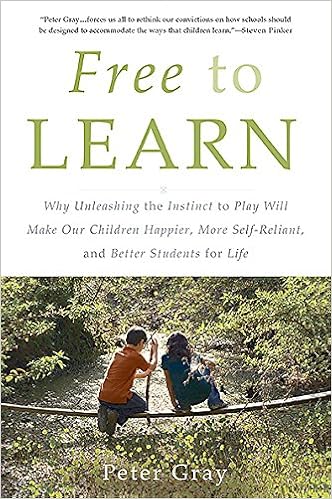Free to Learn by Peter Gray
Chapter 10 - Trustful Parenting in Our Modern World
TRUSTFUL PARENTING: Parents trust children to play/explore on their own, make decisions, take risks, make mistakes, learn from their mistakes, and so forth. They do not direct the child's development since they trust the child to direct their own. This is not neglectful parenting; parents provide freedom with sustenance, love, respect, and support for development as needed.
DIRECTIVE-DOMINEERING PARENTING: Parents work to quash the child's will and replace it with a willingness to abide by the wills of others. This style is not very effective and has greatly diminished as a parenting approach.
DIRECTIVE-PROTECTIVE PARENTING: Parents limit the freedom of children because they fear for the safety of the children. They view children as fragile and incompetent. They believe they can make better decisions for the children than children can for themselves. They work to direct the child's development because they feel that adult plans are the best way for kids to develop.
Of course, Peter Gray advocates a trustful parenting approach. Trustful parents communicate to children: "You are competent. You know what you can do and what your limits are. Your opinions count. You are responsible for your own behavior and your own mistakes. We are with you, not against you."
But the North American culture overall greatly underestimates children's abilities and thus deprives them of opportunities to learn to control their own emotions and behavior. The decline of a more trustful approach is due to some changes in the world: decline of neighborhoods and neighborhood play groups so there are more restrictions to playing around the neighborhood; more culture of fear with media and "expert" warnings and dangers; desire to protect children from mistakes and own foolishness; view of childhood as time for resume building instead of playing (to have a more secure adult future); rise of school-centric model of development and the need to conform to mandatory school requirements. All of these can chip away the trustfulness that parents can have in their children.
Ways to become a more trustful parent (and I think these apply to teachers, too)
- Examine values and how to apply them to children - How can you best build values of responsibility, honesty, self-initiative, etc.? Practice them as adults and help children practice them, too.
- Accept that children need to take ownership of their own futures without adult control. Adults do not determine or set the child's future and should not shoulder the responsibility to direct the child's development. (This doesn't mean that we don't support development; we shouldn't try to direct it.)
- Create safe spaces for play and exploration. Trust the child's ability to do his own activities and don't monitor too obsessively. Consider other alternatives to conventional schooling.
This trustful approach has me thinking. Rather than trying to develop differentiated learning experiences within the classroom environment, we should try to find ways to provide a broad space and materials for learning and allow children to direct that learning on their own. I'm reminded of Gray's discussion of the Sudbury Valley School environment. How can we create learning environments that allow children to take ownership for their own learning, responsibility for their own behavior, and ability to make mistakes and learn from them? Some big things to think.
I'll have one more final reflection post on Free to Learn. It's been an interesting read for me.



